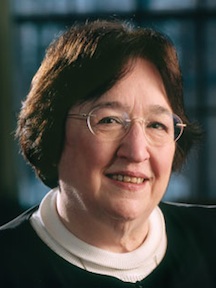By Krista Shaw
A supporter of the liberal arts and a prolific contributor to their study, Helen Vendler has authored and edited more than twenty books in addition to numerous articles in the field of literary criticism. She has extensively contributed to The New York Review of Books, The New Yorker, and The New York Times Book Review, and her interests are as numerous as her contributions to literary criticism, ranging from Shakespeare to Romantic poetry to modern poetry. Vendler was inducted to Phi Beta Kappa in 1960 and served as a Visiting Scholar for the society from 1976-77.
Vendler looks to poetry for her main inspiration, saying in an interview for The Paris Review that poetry draws from the irresistible human desire to play with words. Writing poetry is an innate human activity, Vendler explains; considering and criticizing poetry is likewise an irrepressible human response to verse “that usually occurs spontaneously as the poem rises off the page to meet you.”
According to Vendler, people’s impulse to express themselves in poetry and to gauge what is expressed in the poetry of others, is due the intrinsic social value that poetry holds. In an essay re-published in Harvard Magazine, Vendler argues that our current culture possesses such refined understandings of social issues and fosters such nuanced discussions on ideological ideas because of the works of individual writers and thinkers. Citing examples of this idea, Vendler declares: “The Harlem Renaissance would not have occurred as it did without the stimulus of Alain Locke, Harvard’s first black Rhodes Scholar. Modern philosophy of mind would not exist as it does without the rigors of Wiitgenstein’s Philosophical Investigations.”
In her Harvard Magazine essay, Vendler asserts that the role of universities is to preserve and perpetuate society by producing the next generation of “the makers of culture.” Admissions committees, she cautions, should avoid drawing in students who show promise in fields that garner the attraction of the media, such as biology and technology, at the expense of attracting those students who might one day become poets, philosophers, and artists. She exhorts institutions of higher learning to pay heed to the “professions of art and reflection” by accepting and nurturing the students who will shape culture in years to come.
Though Vendler promotes the humanities as the foundation of culture, she herself followed a less traveled path to studying poetry by earning an undergraduate degree in chemistry from Emmanuel College before choosing to pursue a doctoral degree in English and American literature at Harvard University. However, her past scientific interest continues to inform her present literary career. Science appealed to Vendler because it is, as she explained to The Paris Review, “grounded in material reality.” Vendler attempts to similarly ground her literary criticism in the evidence of the text by pproaching a poem on its own terms and from its own perspective, Vendler hopes to reveal “a view from the inside, not from the outside” of the work.”
Vendler’s support of the liberal arts and her contributions to literary criticism have been recognized by numerous accolades. Among other honors, Vendler received a Fulbright Fellowship in 1954, a Guggenheim Fellowship in 1971, and she was named the National Gallery of Art Mellon Lecturer in 2007. Since 1990, Vendler has been the A. Kingsley Porter University Professor at Harvard University.
Krista Shaw is a senior at the University of Dallas majoring in English. The University of Dallas is home to the Eta of Texas Chapter of Phi Beta Kappa.




